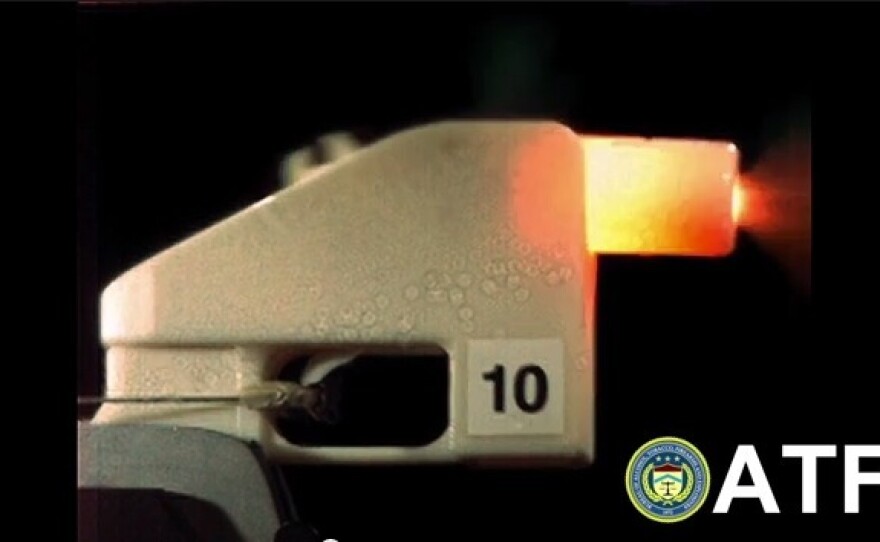Technology helps police solve crimes every day. But some innovations can also present new public safety concerns — and such is the case with guns built using 3-D printers.
Agents at the Bureau of Alcohol, Tobacco, Firearms and Explosives have spent months testing plastic weapons. And in findings released Tuesday, they say the guns are both lethal and hard to detect.
It can take a top-of-the-line 3-D printer between 10 and 18 hours to build parts for a plastic gun, a gun made out of strong and flexible material with bullets that can penetrate a person's vital organs or even a skull at close range.
"When these 3-D firearms are manufactured, some of the weapons can defeat normal detection such as metal detectors, wands, and it could present a problem to public safety in a venue such as an airport, an arena, a courthouse," says ATF assistant director Richard Marianos.
Federal agents say they aren't too worried about a gang member or an ordinary felon getting his hands on a plastic gun. Plastic guns are still less effective than conventional weapons, and the ATF says they have no pending criminal investigations involving illegal possession of these new kinds of firearms. But they worry that for a certain type of criminal, taking the time to buy or lease a 3-D printer could be well worth the trouble.
In Texas, a company called Defense Distributed has put instructions online for making a handgun almost entirely out of plastic. Company founder Cody Wilson didn't respond to interview requests from NPR this week, but he cooperated with a recent documentary made by the online magazine and video channel Motherboard.
"If we make a Second Amendment argument, it's all the way, it's to the limit, you know," Wilson says in the documentary. "But I don't like to make it about the Second Amendment or gun control at all. It's more radical for us. Like, there are people from all over the world downloading our files, and we say, 'Good. You should have access to this.' "
There's nothing illegal about building your own guns at home, so long as you have a federal license if you want to sell the weapons to others. And some plastic weapons have been available since the 1970s. But Earl Griffith, chief of the firearms technology branch at the ATF, says plastic guns have always used metal in parts like the trigger and hammer and firing pin.
The difference now is that the technology is so good and so cheap that plastic guns are beginning to present more of a danger to the public, and less of a risk to the person firing the makeshift weapon.
"Some of the polymers at the low-grade level actually could blow up in the hands of an individual if they tried to use one for any type of purpose," the ATF's Marianos says. "Some of the harder polymers or the more aggressive compounds are able to fire multiple rounds that create an additional danger to the American public."
There's something else. A 1988 law that requires guns to be composed of at least some metal to help people in schools and airports detect them is set to expire early next month. That means the 4 ounces or so of metal in Cody Wilson's Liberator handgun that makes the gun comply with current law will not be necessary if Congress fails to act before Dec. 10.
New York Democratic Rep. Steve Israel, for one, is worried.
"You can always say the genie's out of the bottle, why do we need a new law?" Israel says. "Well, I'll tell you why we need a new law: If it's easy to make plastic guns, we want to make it harder for them to get past metal detectors and onto our planes."
Israel says the law has been reauthorized twice, including back in 2003, during the George W. Bush administration. But even supporters like Israel say the odds this polarized Congress will act before the deadline early next month are slim.
The ATF says it's working with airport security, the Secret Service and other law enforcement partners to do more training about how to detect plastic guns, and it will use its scarce resources to stay on top of this new technology.
Copyright 2023 NPR. To see more, visit https://www.npr.org. 9(MDAzMjM2NDYzMDEyMzc1Njk5NjAxNzY3OQ001))







